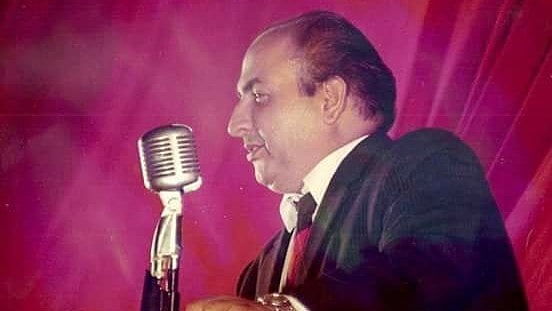
Mohammed Rafi.
Credit: facebook/@imprintsandimagesofindianfilmmusic
Mohammed Rafi (b 1924) was just 55 when he died in 1980. His career spanned a little less than four decades. As we look back, in his birth centenary year, we see an enduring legacy in the form of singers emulating his style and presentation.
‘Mohammed Rafi — Golden Voice of the Silver Screen’, an authorised biography by Sujata Dev, puts the number of his Hindi songs at 4,425. Additionally, the book estimates, he sang 310 non-Hindi film songs, and 328 non-film songs between 1945, when he debuted at the age of 17 with a song in a Punjabi film, and 1980.
Rafi is regarded as one of Indian cinema’s greatest singers, and four decades after his passing, many of his songs are held up as classics of Indian film music. Tribute concerts, where young singers render covers of his hits, are not uncommon.
It is said that Rafi began by imitating a fakir and adapted G M Durrani’s style before he evolved a style of his own. During his glory years, Rafi contended with contemporaries such as Talat Mehmood, Mukesh, Manna Dey and Mahendra Kapoor. Kishore Kumar was the brightest talent in the generation that came after him — he became the voice for the younger heroes emerging in the ’70s. Mukesh, Raj Kapoor’s favourite singer with as huge a following as Rafi, sang quite a few cheerful songs, but came to be more famous for his melancholic numbers. Rafi made a name as a more versatile singer.
Perhaps the most popular singer to have followed Rafi’s techniques and made a mark is Sonu Nigam. In fact, Nigam shot to fame on a music reality show by rendering Rafi songs. He has since sung several original numbers in Hindi films (‘Sandese aate hain’), and, thanks to the runaway hit film ‘Mungaru Male’, was also able to carve a sensationally successful career in Kannada film music as well. Others inspired by Rafi, such as Shabbir, delivered a few hits, but did not last long. S P Balasubramanyam, the prolific south Indian singer, often acknowledged Rafi’s influence on his singing.
What exactly is Rafi’s style? He sang everything — light-hearted love songs, bhajans, qawwalis, ghazals and sad numbers. Many of his songs have an upper-register orientation, and his voice sounds best when it is airy and rising. He had developed a distinctive approach to the rakish, upbeat love song. ‘Aaja aaja main hoon pyar tera’ and ‘O haseena zulfon wale’ (Teesri Manzil) are early examples of how he approached the genre. The glissando in songs like ‘Taarif karoon kya uski’ (Kashmir Ki Kali) is perhaps his trademark. Notice how, each time he says the word ‘taarif’, his voice does a playful jump, slide or somersault. You may also notice that the female singers in his popular duets (Lata and Asha mostly) are excellent and expressive in their own way, but don’t attempt his trademark glissandos. His style enhanced the dashing characters played by Shammi Kapoor, Dev Anand and other leading men of the time, and it was inimitable. So while Mukesh became somewhat synonymous with jilted love (‘Aansu bhari hain yeh jeevan ke raahe/Jaane kahan gaye woh din’), Mahendra Kapoor became the voice of patriotic songs (‘Mere desh ki dharti’) and Manna Dey was preferred for classical raga-based compositions (‘Laga chunari mein daag’), Rafi was the singer for outdoorsy cheer. Not that the singers didn’t do other kinds of songs; it was just that they gravitated to one kind, and excelled at it.
A story is often told about ‘Baiju Bawra’, and how its iconic song about a Hindu deity, ‘Man tarpat Hari darshan ko aaj’, was written (Shakeel Badayuni), set to tune (Naushad) and sung (Rafi) by Muslims. A less frequently told story is about how Rafi’s first wife Bashira Bibi lost her parents in the Partition riots, and refused to live in India any more. Rafi remained in Mumbai, remarried, and delivered songs that won’t be forgotten in a hurry.